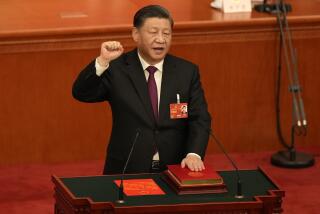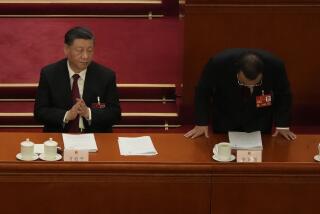China’s New Communists Juggle Business and Politics
- Share via
BEIJING — During the day, Tao Jianxing, a tall, amiable young industrialist from eastern China, attended study sessions at the Great Hall of the People as a delegate to the Communist Party’s 15th National Congress.
At night, Tao, 43, was back in his suite on the seventh floor of the Beijing Hotel negotiating a deal to buy a struggling automobile company in northern Jilin province.
The business negotiations were so complicated, Tao said, that he barely had time to go out on the balcony and gaze at the moon on Tuesday, the peak night of the Mid-Autumn Festival, when the moon is said to be the fullest and brightest.
“It is the fifth year in a row I’ve been away from my home in Jiangsu province for the moon festival,” Tao said. “Two times I was in the United States, once in Hong Kong and once in Japan.”
But when the weeklong Communist Party congress concluded this week, Tao declared himself satisfied on two counts. He had cut the business deal for his Chun Lan Home Appliance Group--manufacturer of motorcycles, air conditioners, mountain bikes and heavy trucks--and he had been elected as an alternate member to the party’s Central Committee.
In both real and symbolic terms, Tao’s participation in the congress and his election to the supreme party leadership body represented the changing image and goals of China’s 58-million-member Communist Party.
Industrialist Tao is a model member of the newly business-minded Chinese Communist Party--call it CCP Inc. His latest goal is to raise $150 million for his company by listing it on the Hong Kong stock exchange. The company is already a popular stock on the Shanghai exchange.
The overriding preoccupation of this party congress was not ideology or public service but how to sell off the country’s 300,000 most unprofitable state-owned enterprises and get on with business.
The 22 appointees to the all-powerful Politburo of the party announced Friday tended to be more like Tao--well-traveled, educated and business-oriented--than the revolutionary veterans, war heroes, factory workers and Marxist ideologues chosen as members in previous congresses.
Six of the seven members of the new standing committee of the Politburo, the core party leadership unveiled by leader Jiang Zemin on Friday, are university graduates.
Five standing committee members--Jiang, Li Peng, Zhu Rongji, Hu Jintao and Wei Jianxing--are engineers. Zhu, China’s economic czar, also served as dean of the prestigious Qinghua University School of Management. Newly installed standing committee member Li Lanqing is a business management graduate of Shanghai’s Fudan University, home of the country’s most renowned business school. Only incumbent member Li Ruihuan, a former construction worker, lacks a university degree.
Sitting in a hotel coffee shop with two fellow delegates from Jiangsu province, Tao declared himself quite comfortable with the mix of business and politics that took place during the party meeting.
One of his colleagues, a debonair party secretary from Suzhou who spent part of the congress promoting a new industrial park in his city, complained good-naturedly about the political study sessions. “It was more serious than when we were still in school,” Yang Xiaotang said.
However, he said, he still had time to send 200 letters to friends and business contacts bearing commemorative party postage stamps. In the United States it would have been called “networking.”
Tao, meanwhile, admitted that the weeklong congress, coupled with his business negotiations, was tiring. He said he was honored to represent his province at the congress, but he had little time for sightseeing or party festivities.
In this sense, he said, his loyalties were divided between his party work and his responsibilities to his 6,000 employees back home in the city of Taizhou.
“Fortunately,” he said, “things worked out well for everyone.”
More to Read
Sign up for Essential California
The most important California stories and recommendations in your inbox every morning.
You may occasionally receive promotional content from the Los Angeles Times.













